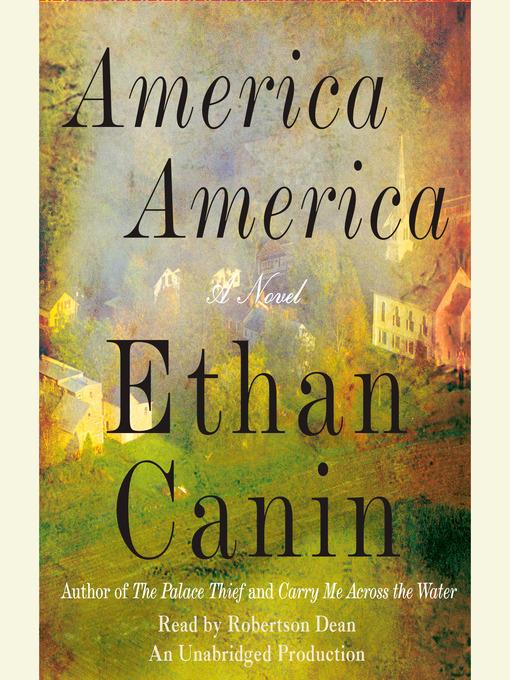
America America
A Novel
کتاب های مرتبط
- اطلاعات
- نقد و بررسی
- دیدگاه کاربران
نقد و بررسی

Set in the early 1970s and today, Canin's novel is equal parts coming-of-age story and snapshot of the later Nixon years, complete with family drama and political scandal. Narrator Robertson Dean brings his soothing baritone voice to this atmospheric work, and the effect is striking. He captures the languorous spirit of the book with subtle inflections and narrates with clear diction, pronouncing every word as if it were the most vital to the story. Dean does not create vivid characters by significantly changing his delivery, but rather by telegraphing their intentions and emotions to us with small changes in pitch and tone. In so doing, he is able to turn the book into a more vibrant, realistic work. R.I.G. (c) AudioFile 2008, Portland, Maine

April 21, 2008
Signature
Reviewed by
Jerome Charyn
Ethan Canin's new novel is a powerful lament that haunts us like a latter-day ghost of The Great Gatsby
. Like Gatsby, it deals with an orgiastic rupture in the American dream. If F. Scott Fitzgerald anatomized the Jazz Age and delivered its own corrupt and luscious poetry, Canin gives us a poisoned lullaby of the Nixon era. Canin's narrator, Corey Sifter, is a kind of Nick Carraway (but with working-class origins), who finds his way into the land of the rich. Corey is 16 in 1971; he lives in a little town in western New York State that used to belong to the Erie and Seneca Indians, but is now ruled by Liam Metarey, a tycoon of Scottish descent whose holdings cover a third of the county.
Liam is a very complicated man. Riddled with guilt over his father's rapacious gathering of wealth, he longs, like some benevolent laird, to reverse America's politics of greed. He sets about creating his own president, Henry Bonwiller, a United States senator from New York who is a champion of the working man and wants to get America out of Vietnam. He also “adopts” Corey, the son of a plumber and sidewalk contractor who “always smelled of lime.” Corey becomes a caretaker of Liam's grounds and mingles with his dysfunctional family. The Metareys, he tells us, “lived all year on their estate and we lived on land that had once been their horse pastures.”
Corey soon becomes involved in Bonwiller's presidential campaign. But Bonwiller is a deeply flawed candidate—a megalomaniac, a drunkard and a philanderer. He has a fling with a local beauty pageant queen, JoEllen Charney, who is a younger replica of his wife. And a little before the Iowa caucuses, JoEllen is found dead, “encased in ice in an apple orchard.” Bonwiller abandoned her during a car accident, but it's never made clear how she died. The entire novel seems to take place “behind a window of warped black glass.”
This is the great strength of the writing. The language is often supple, can leap from impressionistic poetry to a coroner's report, and can whiplash through time, from the 1970s to 2006, when Corey has become the publisher of a small independent newspaper and is married to one of Liam's daughters. Like Nick Carraway, Corey isn't always a reliable narrator: we have to trust his own imaginings about JoEllen and the coverup surrounding her death. Yet he too lurks behind that window of black glass. His own intern, Trieste Millbury, a high school student who lives in a trailer, realizes how Corey has fallen into the myth of the Metareys and blinded himself to their own blinding power. But together Trieste and Corey form a marvelous chorus, commenting upon and reliving the splintered action of this splendid novel.
Jerome Charyn's most recent novel,
Johnny One-Eye: A Tale of the American Revolution, was published by Norton.

Starred review from July 28, 2008
Canin's marvelous tale of Corey Sifter, a young working-class man who goes to work for a powerful family and ends up entangled in a political debacle, is wonderfully realized by Robertson Dean, whose deep bass tone is at once powerful and intimate. Told from Sifter's perspective as an older man, Dean captures every possible emotion that saturates Sifter's tone, be it regret or affection, and it's hard not to be riveted. His shifts in tone and dialect for many characters are subtle, his pacing is steady. Dean is quite possibly the quintessential narrator. A Random House hardcover (Reviews, Apr. 21).

























دیدگاه کاربران